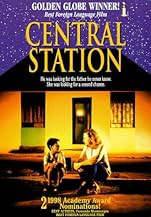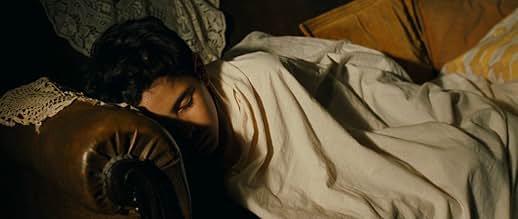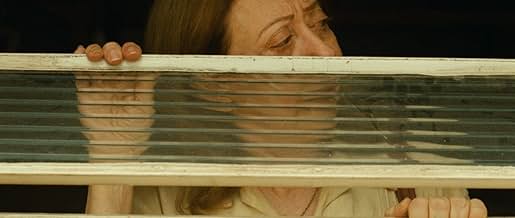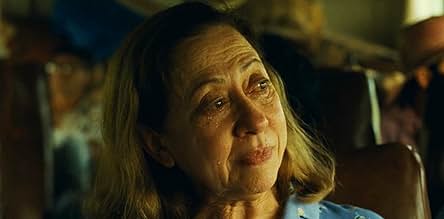Central do Brasil
- 1998
- Tous publics
- 1h 50min
NOTE IMDb
8,0/10
49 k
MA NOTE
L'aventure émotionnelle d'une ancienne institutrice, qui écrit des lettres pour les analphabètes et d'un jeune garçon dont la mère vient de mourir, dans leur quête pour retrouver son père, q... Tout lireL'aventure émotionnelle d'une ancienne institutrice, qui écrit des lettres pour les analphabètes et d'un jeune garçon dont la mère vient de mourir, dans leur quête pour retrouver son père, qu'il n'a jamais connu.L'aventure émotionnelle d'une ancienne institutrice, qui écrit des lettres pour les analphabètes et d'un jeune garçon dont la mère vient de mourir, dans leur quête pour retrouver son père, qu'il n'a jamais connu.
- Réalisation
- Scénario
- Casting principal
- Nommé pour 2 Oscars
- 44 victoires et 26 nominations au total
Avis à la une
10BB-12
This movie is special.It shows the real Brasil with a simple but beautiful and touching story about a little boy looking for the father he never knew and a woman looking for a second chance. The performers are brilliant! Fernanda Montenegro is extraordinary in the role of Dora.The chemistry between the main characters (Dora and Josué) is splendid. The film photography is wonderful, so as the instrumental soundtrack. Central do Brasil(Central Station) is one of the best movies I have ever seen.
Be ready to weep and be happy!
Be ready to weep and be happy!
10jotix100
This film, which we watched at the Vancouver Film Festival years ago, turned up the other night on cable. On second viewing, the film still packs quite an impact, as it still feels real. The work of Walter Salles and Fernanda Montenegro was amazing then, and still is now.
This is the story about a cynic and jaded woman who resorts to do menial work and who is a small con artist herself. Dora has seen better days. She is retired now, but in order to make ends meet, she sets a letter writing desk at Rio's train station where she writes letters dictated to her by the illiterate and eager people who can't do the job as they want to communicate with distant family and friends through Dona Dora. In many cases, as it's the case with the letter she has written for Ana, she has no intention of ever sending those missives dictated to her by the unsuspecting people.
Josue, the small boy, who witness the death of his mother, is wiser for his younger years than one might suspect. He sees right through Dora as a charlatan and a con woman. When Dora takes the boy home, she has no intentions of ever helping him much more than a few days. Later, upon learning about the adoption agency, she sells the boy to the unscrupulous people involved in the traffic of children for a thousand dollars without any problems. It's only when her friend Irene tells her the fate that Josue will encounter, that Dora leaps into action.
Since she can't stay home without having to return her money, she takes Josue on the road. This odd couple begins the journey as complete strangers, but this voyage will make them appreciate one another and even move Dora into becoming a better woman for having the courage to do the right thing. Josue also realizes that Dora, in her own way, has been, for however short, the mother he lost in the tragic accident.
Fernanda Montenegro, perhaps Brazil's best actress, is amazing as Dona Dora. She is the whole reason for seeing the movie. Her Dora is one of the best creations in her film career. This intense performer shows an actress who fully understand who Dora is and the way she would behave in the situation. Young Vinicius Oliveira is a sweet Josue, and Marilia Pera, is the kind Irene, who makes Dora see the monstrosity of what she was about to do.
The music by Jacques Morelembaum and Antonio Pinto is an asset, as it adds an atmosphere to the long journey of Dora and Josue. The interesting cinematography by Walter Carvalho, shows the immensity of Brazil's interior as the odd couple go to find the little boy's father.
This film is a triumph for both Walter Salles and Fernanda Montenegro.
This is the story about a cynic and jaded woman who resorts to do menial work and who is a small con artist herself. Dora has seen better days. She is retired now, but in order to make ends meet, she sets a letter writing desk at Rio's train station where she writes letters dictated to her by the illiterate and eager people who can't do the job as they want to communicate with distant family and friends through Dona Dora. In many cases, as it's the case with the letter she has written for Ana, she has no intention of ever sending those missives dictated to her by the unsuspecting people.
Josue, the small boy, who witness the death of his mother, is wiser for his younger years than one might suspect. He sees right through Dora as a charlatan and a con woman. When Dora takes the boy home, she has no intentions of ever helping him much more than a few days. Later, upon learning about the adoption agency, she sells the boy to the unscrupulous people involved in the traffic of children for a thousand dollars without any problems. It's only when her friend Irene tells her the fate that Josue will encounter, that Dora leaps into action.
Since she can't stay home without having to return her money, she takes Josue on the road. This odd couple begins the journey as complete strangers, but this voyage will make them appreciate one another and even move Dora into becoming a better woman for having the courage to do the right thing. Josue also realizes that Dora, in her own way, has been, for however short, the mother he lost in the tragic accident.
Fernanda Montenegro, perhaps Brazil's best actress, is amazing as Dona Dora. She is the whole reason for seeing the movie. Her Dora is one of the best creations in her film career. This intense performer shows an actress who fully understand who Dora is and the way she would behave in the situation. Young Vinicius Oliveira is a sweet Josue, and Marilia Pera, is the kind Irene, who makes Dora see the monstrosity of what she was about to do.
The music by Jacques Morelembaum and Antonio Pinto is an asset, as it adds an atmosphere to the long journey of Dora and Josue. The interesting cinematography by Walter Carvalho, shows the immensity of Brazil's interior as the odd couple go to find the little boy's father.
This film is a triumph for both Walter Salles and Fernanda Montenegro.
Great movie, warm and bittersweet. It somehow reminded me of
My Life as a Dog (1985) because it more or less deals with the
same issues, but we move from the Swedish North to the sunny
Brazilian South. Beautiful colors, great acting--Josue and Dora
make a wonderful pair and they really foil each other out. Almost
starts dragging a little before the end, but it picks up again. I highly
recommend.
My Life as a Dog (1985) because it more or less deals with the
same issues, but we move from the Swedish North to the sunny
Brazilian South. Beautiful colors, great acting--Josue and Dora
make a wonderful pair and they really foil each other out. Almost
starts dragging a little before the end, but it picks up again. I highly
recommend.
I thought this movie was terrific, a little slow in parts, but I cared about the characters and was interested in their journey. I also liked the fact that the main character was not portrayed as a saint - Dora is a real person, flaws and all. Montenegro was robbed at the Oscars and so was the movie.
This film is uncommonly powerful, with very dark tones but bursting with hope and love. The main character, a jaded and bitter letter writer working in Brazil's largest train station (Fernanda Montenegro), is suddenly burdened with a kid who eventually wins her over. But unlike the common feel-good comedies with the same setup, Central do Brasil takes the viewer on a sometimes hopeless, openly vulnerable, and powerfully emotional journey. You can really feel the connection between the boy and his new caretaker – you can feel all of her emotions, really, because her acting is just that spectacular. The acting, the camera work, the soundtrack, and the beautifully written story all come together to produce just an amazing movie, well worth watching, that may just jerk a tear from your eye.
Le saviez-vous
- AnecdotesVinícius de Oliveira , a shoeshine boy, beat out more than 1,500 other young actors for the role of Josué.
- GaffesWhen Dora gets off the bus leaving Josue behind, she enters a diner, and in the view of the wall off to the side are three stacks of plastic red crates containing empty soda bottles. Following a quick cutaway and return to the same view, there's only one stack of red crates; the others are replaced by two stacks of larger milk-style crates of different colors.
Meilleurs choix
Connectez-vous pour évaluer et suivre la liste de favoris afin de recevoir des recommandations personnalisées
- How long is Central Station?Alimenté par Alexa
Détails
- Date de sortie
- Pays d’origine
- Site officiel
- Langue
- Aussi connu sous le nom de
- Estación central de Brasil
- Lieux de tournage
- Sociétés de production
- Voir plus de crédits d'entreprise sur IMDbPro
Box-office
- Budget
- 2 900 000 $US (estimé)
- Montant brut aux États-Unis et au Canada
- 5 969 553 $US
- Week-end de sortie aux États-Unis et au Canada
- 35 708 $US
- 22 nov. 1998
- Montant brut mondial
- 5 981 999 $US
- Durée
- 1h 50min(110 min)
- Couleur
- Mixage
- Rapport de forme
- 2.35 : 1
Contribuer à cette page
Suggérer une modification ou ajouter du contenu manquant


























